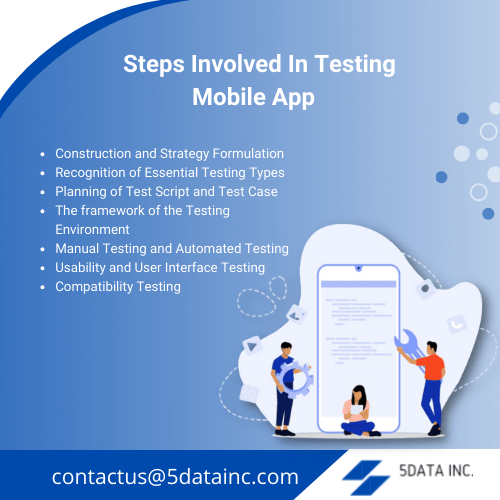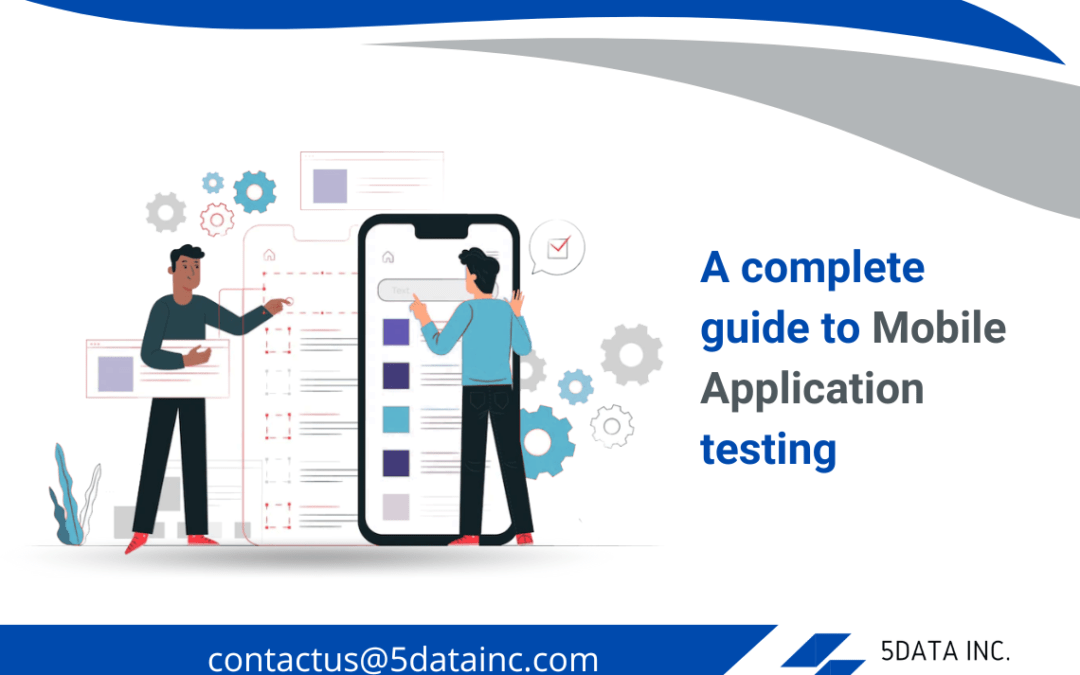Introduction
Mobile internet consumption continues to rise even as laptop internet usage is declining, a new trend that has continued unabated for years. As many more users spend more time on mobile devices, providing such a good experience on mobile applications is condemning.
Mobile application testing is the process through which all the applications are tested for essential features, quality, compatibility, scalability, convenience, production, and many more characteristics.
Developers regularly perform application testing after a mobile application is developed or before it is declared to the users. Commonly, the main objectives of mobile application testing are OS compatibility, hardware compatibility, usability, functionality, and source code evaluation. Mobile application testing can be automated, self-operating, or manually tested.
Mobile application testing company provides a broad range of certifications & high-quality testing team. Mobile applications either come pre-installed or can be downloaded or installed from mobile software distribution platforms.
Importance Of Mobile Application Testing
It helps to validate the appearance, presentation, and connectivity of apps across various devices. Optimizing applications for mobile-OS combinations are popular among the users, which helps the app provide a seamless user experience, irrespective of the OS or device. It helps to deliver a strong and customer-centric experience for the upcoming users. In conclusion, the better the user experience, the more the probability of higher outreach.
Mobile application testing is important for businesspeople as the numbers specify the remarkable growth in the consumption of mobile devices in the future. The growth of mobile devices also encourages the development of advanced mobile apps which focus on making business services more reachable. Naturally, businesses must ensure that their mobile apps are optimized and future-ready for advanced smartphones. Let’s discuss more mobile application testing in detail.

Steps Involved In Testing Mobile App
1. Construction and Strategy Formulation: It is the most important step as all others depend upon it. This step includes many activities, including determining benefits and recognizing the targeted devices.
2. Recognition of Essential Testing Types: As the clients have different mobiles, it is important to ensure that the mobile application performs well on all Android and iOS devices.
3. Planning of Test Script and Test Case: A test case refers to the sequence of steps that helps perform a particular Application test.
4. The framework of the Testing Environment: Presenting the codes and devices to perform app testing is a testing environment.
5. Manual Testing and Automated Testing: The main functionalities of the mobile application are tested through automatic testing and mobile.
6. Usability and User Interface Testing: Usability testing ensures the application is very easy to use.
7. Compatibility Testing: Testing verifies the mobile application across various networks, devices, browsers, and the operating system
What Is The Difference Between Mobile Application Testing And Mobile Testing?
Let us know the difference between these two in brief.
Mobile application testing:
Mobile application testing can be automatic and helps to confirm that the application delivered to the end-users meets all business demands and users’ expectations.
Mobile testing:
Mobile testing is the process by which applications for present-day mobile devices are tested for performance and usability. It includes testing for native mobile apps and responsive web or hybrid apps.
Now let us look into the different types of testing used to Test Mobile Applications in detail.
Different Types Of Testing Used To Test Mobile App
1. Functional testing: Mobile application functional testing service of mobile apps is chosen to ensure that each functional aspect of the app is applied and works according to the defined business demands. Mobile application Functional testing company is the first kind of testing to be carried out by a single team that tests the mobile app.
2. Usability testing: Passing the usability test is critical for any mobile app as it ensures the app meets the user experience criteria. For example, ensuring an intuitive app design in the arrangement, navigation options, buttons, colors, quick response to a task performed in the app, etc., are some features that would impact user experience.
3. Performance testing: Mobile app users have very high assumptions about how the app should answer to every action they initiate. Starting from the app reference, respond on a Click event, navigation, transaction completion, and place the app in the background when shifting between apps, the belief on the response time of each event matters a lot. If the app does not respond to these events in a time of 3 to 4 seconds, they will end up frustrated and might even uninstall the app. Performance testing is the main testing.
4. Security testing: Security threat is crucial to any software application. It becomes one of the top-looked keywords on the internet if a security breach is recognized in an app, especially in a mission-critical app or the app requiring financial transactions. It is the best Mobile Security Testing service. The OWASP Mobile Security is a concentrated resource intended to give the security teams the resources they need to keep secure mobile apps.
In the next section let us discuss more about Mobile testing tools.
Mobile Application Testing Tools
1. Test Complete: Test Complete permits you to run various repeated UI tests over the application platform. It is an amicable tool that can guide in testing hybrid mobile apps, which means it will keep up with Android and IOS app testing.
2. Test IO: Test IO permits you to test the mobile apps in real-time to ensure that the application appointed for business is ordered on almost all mobile OS platforms. These testing tools are, at times, ahead of the full-time testers in detecting internal bugs.
3. Appium: Appium is one of the best mobile app testing tools most executive testers use. Appium is an efficient tool for web and mobile that operates well even for hybrid applications.
Conclusion:
5Data Inc is very helpful in manual and automated testing application services which are carried out through tools in different fields including Banking, Insurance, Travel, and Retail. With so much opposition in the mobile application market, it’s hard to stay pertinent without delivering high-quality apps. Mobile app testing is the only way to ensure that the application meets all the demands or requirements and is error-free. In addition, it needs full-time employees for mobile testing services to deliver the best product to the users. Mobile testing professionals have the right tools, a refined skillset, and diversified experience, all factors that help you create high-quality mobile apps.

